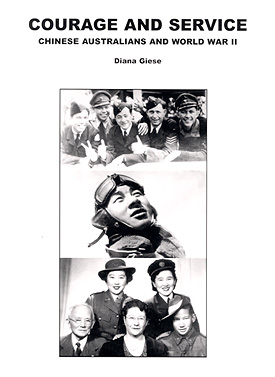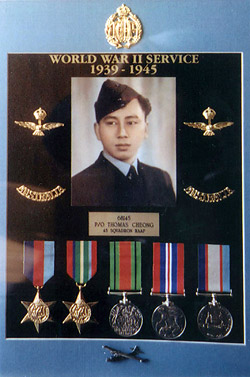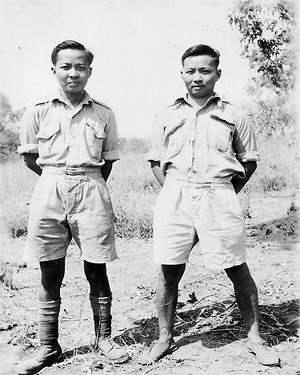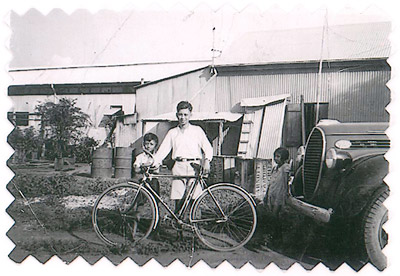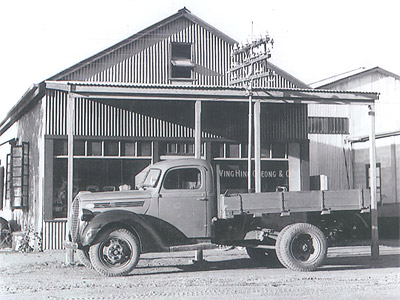|
Read extracts, Courage and Service: Chinese Australians and World War II‘19 February 1942
Although he had suffered Japanese bombing in China, Ray Chin, by then working in his grandfather’s shop in Darwin, was unprepared for the scale of this raid. "It gave me the shock of my life. Everybody stopped breakfast and started crawling into the slit trenches." He watched from a tree behind the Church of England until the bombs "got a bit close, and the shrapnel hit me, so I had to crawl into a hole. I saw them hit the Neptuna in the Harbour alongside the Wharf, loaded with ammunition and mines. Sergeant McNab, the policeman, was wheeling his pushbike around warning everybody: 'Get out of town—the ships are going to explode any time.' By the time I got to the middle of town, the ship did explode. It was like little matchsticks." Tom Cheong was at his job in the Public Works Department, less than a kilometre away from the Wharf and some huge oil tanks. He heard the sirens and ran out. At first he thought the planes overhead were the Americans returning—then they saw the bombs falling. Mr Cheong took shelter in a stormwater canal with another man. When shrapnel from one of the oil tankers burning in the Harbour started to land nearby, he fled…
Herbert Wong was in the thick of the bombing at the RAAF Base. He had been doing a job for the Public Works Department in his new truck, which had cost him 400 pounds. "There was no warning at all. Just a chap came out and fired a pistol. I could see five planes just above the ground, very low. Then the Airforce personnel in the Officers’ Mess came out and said: 'Looks like there’s an air raid. You men better get under cover.'" Mr Wong sheltered in a slit trench with a workmate. "After they dropped their bombs, they came down and they machine-gunned us. Where I was, behind the Officers’ Mess, they’d built a little sandbag there, and inside was a machine gun. A person came up. He just had his pants on—no shirt. He just jumped into this machine gun. And as this plane, after bombing, circled around to have a look at us, he opened fire: put-put-put-put. Didn’t hit it. As the plane came very low, I could see the pilot’s face watching us."
When the bombing died down, Tom Cheong went back to where he was living, out of Chinatown. His sixteen-year-old cousin, Horace Lee, arrived in search of his father and brother. By bike, they ventured back into an eerily empty Chinatown. Only Australian and American military police were around. They drove up and told them to leave. Up until then, "we didn’t have directions of any kind. We didn’t know what to do…we thought at first that the Japanese were going to land paratroopers to take over Darwin." |
|||||||||
|
After five anxious hours searching for their relatives, the boys came across some friends, Mitchell and William Lee, leaving Darwin in their truck. They hitched a lift on the back to Adelaide River—and found the other Lees already there: "they must have moved pretty quickly"… "Most probably we shouldn’t have left Darwin." Businesses and homes like Mr Cheong’s uncle’s were left as they stood, unlocked and unprotected, "money in the till": "we didn’t take a thing with us"…
At the RAAF Base, Herbert Wong remembers: "There was no All Clear. The planes, after they’d dropped their bombs, disappeared. Then this chap came out and fired his pistol again and said, 'It’s All Clear.' So we got out of the trench. I looked to where my truck had been standing. It wasn’t blown away. But it had disappeared. "I left my key in there because I was working. I never saw it again." ’ |
||||||||||
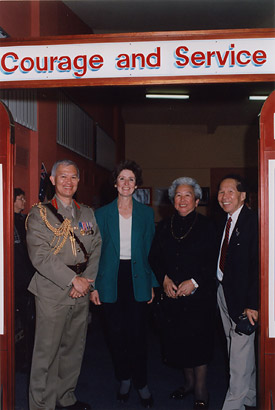
Major General Darryl Low Choy, Diana Giese, Eunice Leong and Gilbert Jan at the opening of the Courage and Service exhibition at the Golden Dragon Museum in Bendigo. Borrow the book from libraries including the Australian War Memorial Research Centre, state and university libraries Access at the National Library of Australia at https://catalogue.nla.gov.au/Record/728350 Find in a library at |
(From interview with Major General Darryl Low Choy, November 1998, for the Courage and Service project)
|

